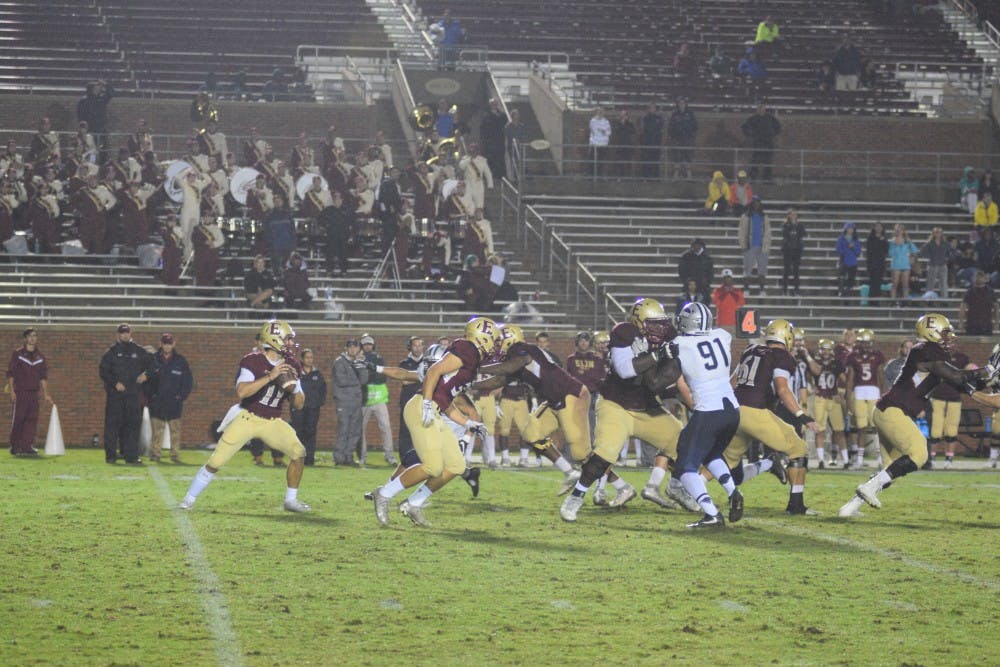No matter how hard Elon University tried to keep the influence of North Carolina’s House Bill 2 off of its campus, the controversial bill has created yet another problem for Elon.
And this time, it’s with the football team.
Elon is slated to play the State University of New York at Albany in a home game in 2017, but New York’s ban on nonessential travel to the state of North Carolina has created complications for the two schools and the Colonial Athletic Association (CAA).
And while most schools in the CAA have released their schedules during the past few days, Elon’s and UAlbany’s remain in limbo while the schools and CAA commissioner Joe D’Antonio attempt to work out a way to play the game.
When New York Governor Andrew Cuomo banned all non-essential state travel to North Carolina March 28, 2016, the CAA did not feel an immediate impact from the move. The only all-sports school from New York — Hofstra University — is a private institution, and thus not beholden to the ban.
But two football-only schools — UAlbany and Stony Brook University — are state schools. Elon played at UAlbany Oct. 29, 2016, and Albany is supposed to return to face the Phoenix in 2017.
In a phone interview Saturday, Jan. 21, CAA spokesman Rob Washburn said the parties are exploring all alternatives, but didn’t comment when asked if the game may not be played at all.
Both schools declined comment on the matter at the time Saturday, indicating they’d rather wait until a decision is made before they comment.
The CAA released a plan Sept. 23, 2016 stating what it would do if HB2 were not repealed by Jan. 10, 2017 — which it has not been, despite a special session called for that purpose Dec. 21, 2016. In the Council of Presidents meeting in September 2016, the conference said it would remove its neutral-site women’s golf championship and would consider what to do with the men’s and women’s tennis championships on Elon’s campus and the baseball championship on the University of North Carolina at Wilmington’s campus.
Washburn said in the same phone interview that the conference has not officially moved the women’s golf championship from St. James Plantation in Southport, North Carolina, despite the previous statement that it would. Washburn indicated the championship — along with the three on-campus championships in North Carolina in the spring, including the two tennis championships at Elon — could still be moved, though.
The Public Facilities Privacy & Security Act, more commonly known as HB2, was passed on March 23, 2016, as “an act to provide for single-sex multiple occupancy bathrooms and changing facilities in schools and public agencies to create statewide consistency in regulation of employment and public accommodations.”
Two days later, Elon released a statement saying that the school, “remains committed to inclusion and equal protection for all people. Elon does not discriminate based on sexual orientation or gender identity. The new law does not apply to private institutions and will not impact Elon’s policies and practices.” President Leo Lambert wrote a letter that was published in the Burlington Times-News a week later, calling the law “stunning and disappointing.”
Elon head men’s basketball coach Matt Matheny also spoke out against the law in a July 20, 2016, story on USA Today, saying, “What I love about coaching is that I can sit down with players of different backgrounds. It’s important to expose players to what’s going on outside the basketball court. It’s important that they’re aware of issues that our state and our country faces. As coaches, we’re the leaders. It’s important that we as coaches at programs — big or small — use our platform to promote a positive message.”
Elon's message on HB2 has been consistent, but it may not make a difference when it comes to the school's football game against UAlbany. And, until a solution is reached, there is some doubt as to whether the game will be played at all.


